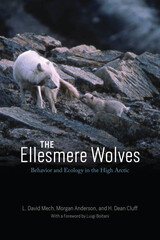
Discover the Far North hand-in-hand with two leading authorities on the Arctic.
This travel guide offers a unique eight-day tour of the Canadian Arctic, starting at Iqaluit near the head of Frobisher Bay (2,000 kilometers north of Ottawa), flying across the line of the Arctic Circle to Resolute, and onward to Ward Hunt Island, the northernmost airstrip in North America. Whether you make the journey in person or as an armchair traveler, this eye-opening book will tell you just what makes this region so extraordinary. Stager and Swain comment on everything that's likely to catch your attention from the air, on the ground, or in the frigid waters--from the lay of the land to the cost of the food, from frost polygons to sea smoke, from narwhals to snow geese, from kayaks to icebreakers, from soapstone sculptures to satellite dishes.
Canada North: Journey to the High Arctic makes the best of traveling companions: compact, informed, and lively. You'll want to read and reread it as you plan the journey of a lifetime.

For parts of twenty-four summers, wolf biologist L. David Mech lived with a group of wolves on Ellesmere Island, some six hundred miles from the North Pole. Elsewhere, most wolves flee from even the scent of humans, but these animals, evolving relatively free from human persecution, are unafraid. Having already spent twenty-eight years studying other populations of wolves more remotely by aircraft, snow-tracking, live-trapping, and radio-tracking, Mech was primed to join their activities up close and record their interactions with each other. This book tells the remarkable story of what Mech—and the researchers who followed him—have learned while living among the wolves.
The Ellesmere wolves were so unconcerned with Mech’s presence that they allowed him to camp near their den and to sit on his all-terrain vehicle as he observed them, watching packs as large as seven adults and six pups go about their normal activities. In these extraordinarily close quarters, a pup untying his bootlace or an adult sniffing his gloved hand was just part of daily life. Mech accompanied the wolves on their travels and watched as they hunted muskoxen and arctic hares. By achieving the same kind of intimacy with his wild hosts’ every action that we might experience living with domesticated dogs, Mech gained new insights into common but rarely studied behaviors like pup feeding, food caching, howling, and scent-marking. After Mech’s time at Ellesmere ended, his coauthors and fellow wolf researchers Morgan Anderson and H. Dean Cluff spent parts of four summers studying the wolves via radio collars, further illuminating the creatures’ movements and ecology. This book synthesizes their findings, offering both a compelling scientific overview of the animals’ behavior—from hunting to living in packs to rearing pups—and a tale of adventure and survival in the Arctic.
READERS
Browse our collection.
PUBLISHERS
See BiblioVault's publisher services.
STUDENT SERVICES
Files for college accessibility offices.
UChicago Accessibility Resources
home | accessibility | search | about | contact us
BiblioVault ® 2001 - 2024
The University of Chicago Press









